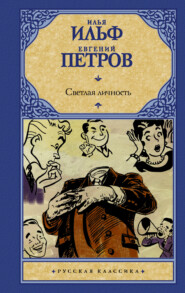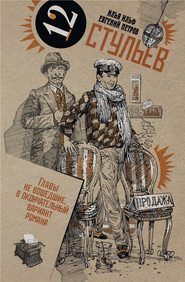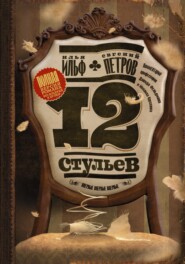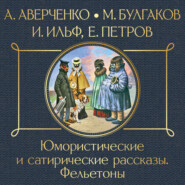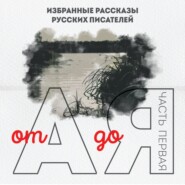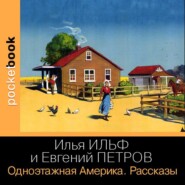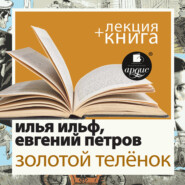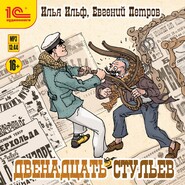По всем вопросам обращайтесь на: info@litportal.ru
(©) 2003-2025.
✖
Одноэтажная Америка / Little Golden America
Автор
Жанр
Серия
Год написания книги
1937
Теги
Настройки чтения
Размер шрифта
Высота строк
Поля
In all the large cities of the world one can always find a place where people look at the moon through a telescope. Here, on Forty-second Street, we also found a telescope. But it was mounted on an automobile.The telescope pointed at the sky. In charge of it was an ordinary mortal, just like the men at the telescopes in Athens, in Naples, or in Odessa. And his was the joyless manner peculiar to all exploiters of street telescopes throughout the world.
The moon showed itself in the interstice between two sixty-storied buildings. However, the curious onlooker, applying himself to the tube, gazed not at the moon but considerably higher: he looked at the top of the Empire State Building and its hundred and two stories. In the light of the moon, the steel eminence of the Empire State seemed to be covered with snow. The heart turned cold at the sight of this chaste and noble building glistening like a sliver of artificial ice. We stood there long, silently gazing up. The skyscrapers of New York make one proud of all the people of science and of labour who build these splendid edifices.
The news vendors roared hoarsely. The earth trembled underfoot, and through the grates in the sidewalk came a sudden gust of heat as if from an engine-room. That was because down there passed a train of the New York metro – the subway, as it is called here.
Through vents, placed in the pavement and covered with round metallic covers, steam broke out. For a long time we could not understand where that steam came from. The red lights of the advertisements cast an operatic light upon it. Almost at any moment one expected (he vents to open, Mephistopheles spring out of one of them, and, after clearing his throat, begin to sing in deep bass, right out of Faust: “A sword at my side, on my hat a gay feather; a cloak o’er my shoulder – and altogether, why, got up quite in the fashion!”
We again rushed forward, deafened by the cries of the news vendors. They shout with such desperation that, to use Leskov’s expression, it is afterwards necessary for a whole week to dig the voice out with a shovel.
It cannot be said that the lighting of Forty-second Street was mediocre. And yet Broadway, lighted by millions and perhaps even by billions of electric lamps, filled with swirling and jumping advertisements constructed out of kilometres of coloured neon tubes, appeared before us just as unexpectedly as New York itself rears up out of the limitless vacancy of the Atlantic Ocean.
We stood at the most popular corner in the States, at the corner of Forty-second and Broadway. The “Great White Way,” as Americans call Broadway, stretched before us.
Here electricity has been brought down (or brought up, if you like) to the level of a trained circus animal. Here it has been forced to make faces, to hurdle over obstacles, to wink, to dance. Edison’s sedate electricity has been converted into Durov’s trained seal. It catches balls with its nose. It does sleight-of-hand tricks, plays dead, comes to life, does anything it is ordered to do. The electric parade never stops. The lights of the advertisements flare up, whirl around, go out, and then again light up: letters, large and small, white, red, and green, endlessly run away somewhere, only to return a second later and renew their frantic race.
On Broadway are concentrated the theatres, cinemas, and dance halls of the city. Tens of thousands of people move along the pavements. New York is one of the few cities of the world where the population promenades on a definite street. The approaches to the cinemas are so brightly lighted that, it seems, if anyone were to add one more little lamp the whole thing would blow up from excessive light, all of it would go to the devil. But it would be impossible to squeeze in another little lamp; there is no room for it. The newsvendors raise such a howl that digging the voice out of it would require more than a week, more likely years of persistent toil. High in the sky, on some uncounted story of the Paramount Building, flared the face of an electric clock. Neither star nor moon was visible. The light of the advertisements eclipsed everything else. In the display windows, among simple crisscross neckties, small illuminated price tags turn around and go into a balancing act. These are the micro-organisms in the cosmos of Broadway’s electricity. In the tumultuous uproar a calm beggar plays his saxophone. A gentleman in a top-hat walks into a theatre, and with him is the inevitable lady, whose evening-gown has a train. A blind man led by a dog moves like a sleep-walker. Certain young men walk without hats. That is fashionable. Their neatly combed hair glistens under the street lamps. The odour of cigars, nasty ones and expensive ones.
At that very moment, when it occurred to us that we were so far from Moscow, before us floated the lights of the Cameo motion-picture theatre. The Soviet film, The New Gulliver, was being exhibited there.
The surge of Broadway carried us several times back and forth, and flung us into a side street.
We knew nothing yet about the city. Therefore, we cannot mention the streets here. We remember only that we stood under the trestle of an elevated railway. An autobus passed, and without much ado we boarded it.
Even several days later, when we began to orient ourselves in the New York whirlpool, we could not remember where the autobus took us that first evening. It seems to us that it was the Chinese section, but it is quite possible that it was an Italian or a Jewish section.
We walked along narrow, smelly streets. No, the electricity here was ordinary, not like a trained animal. It shone rather dimly, and it did not indulge in any hurdles. A large policeman stood against the wall of a house. On the cap over his broad, imperious face gleamed the silver shield of the City of New York. Having noticed the uncertainty with which we walked down the street, he came to us; but, receiving no inquiry, again returned to his vantage-point at the wall, ever the stiff and stately minion of the law.
From one shabby little house came dull singing. The man who stood at the entrance to the house told us that this was the night lodging of the Salvation Army.
“Who may sleep here?”
“Anyone. No one is asked his name. No one is asked about his occupation or his past. Here night lodgers receive bed, coffee, and bread free of charge. In the morning they also get coffee and bread. Then they are free to go away. The sole condition is that they must take part in the evening and morning prayers.”
The singing that reached us from the house gave evidence of the fact that at this very moment this sole condition was being fulfilled. We went in.
Previously, about twenty-five years ago, there was a Chinese opium smoking den in this dwelling. It had been a dirty and dismal den of iniquity. Since then it had become cleaner, but, while losing its erstwhile exoticism, it did not become less dismal. The upper part of the former den of iniquity was devoted to prayer meetings, while below, the sleeping quarters consisted of bare walls, a bare stone floor, and canvas folding cots. That odour of coffee and dampness, which is always a part of hospital and charity cleanliness, permeated all. In a word, this was an American staging of Gorky’s Lower Depths.
In this bedraggled hall the night lodgers sat stiffly on benches that came down in an amphitheatre toward a small stage. As soon as the singing stopped, the next number on the programme began.
Between an American national flag, which stood on the stage, and Biblical texts, which hung all over the walls, a pinkish old man in a black suit jumped like a clown. He talked and gesticulated with such passion that he gave the impression of selling something. Yet he was merely telling the instructive history of his life, telling about the beneficent crisis when he turned his heart back to God.
He had been a tramp (“as frightful a tramp as you, old devils!”), he had carried on horribly, had used profane language (“remember your own habits, my friends”), he stole – yes, all of that happened, too, alas! But now it was all done with. Now he owned his own home and lived like a decent man (“Hasn’t God created us in his own image, in his own manner?”). Not long ago he had even bought himself a radio receiving set. And all this he had received directly with the help of God.
The old man talked with extraordinary facility; it seemed therefore I hat he was now appearing for at least the thousandth time. He clicked his fingers, laughed hoarsely, sang religious ditties, and ended up with great enthusiasm, shouting:
“Let’s sing, brothers!”
Again the dull, humdrum singing began.
The night lodgers were appalling. Almost all of them were no longer young. Unshaven, with lustreless eyes, they swayed on their crude benches. They sang submissively and lazily. Some of them could not overcome the fatigue of the day, and slept.
We vividly imagined to ourselves the wanderings through the frightful places of New York, the days passed at bridges and warehouses, in the midst of garbage, in the everlasting nebulousness of human degeneration. To sit after that in a night lodging and sing hymns was sheer torture.
Then before the audience appeared a fellow as hale and healthy as a policeman. He had a lilac-coloured vaudevillian nose and the voice of a skipper. He was as bold and jaunty as anyone could possibly be. Again began a tale about the benefits of turning to God. The skipper, it seemed, had also been quite a sinner at one time. His fantasy was not great, however, and he soon ended up with the declaration that now, thanks to God’s help, he, too, had a radio receiving set.
Again they sang. The skipper waved his arms, displaying considerable experience as an orchestra leader. Two hundred men ground to powder by life again listened to this conscienceless twaddle. These poor people were not offered work, they were offered only God – a God as spiteful and exacting as the Devil.
The night lodgers did not object. Any god with a cup of coffee and a slice of bread was fairly acceptable. Let us sing then, brothers, to the glory of the coffee god!
And the throats, which for half a century had belched forth only horrible oaths, drowsily began to blare now the glory of the Lord.
We again walked through some slums and again did not know where we were. With thunder and lightning, trains raced overhead along the railroad stockades of the elevated railway. Young men in light-coloured hats crowded around drug-stores, exchanging curt phrases. Their manner was exactly like that of the young men who in Warsaw populate Krakhmalnaya Street. In Warsaw a gentleman from Krakhmalnaya is not considered exactly God’s precious little ewe lamb. It is sheer luck if he turns out to be merely a thief, for he might be something much worse than that.
Late at night we returned to our hotel, not yet disappointed with New York nor elated over it, but rather disturbed by its hugeness, its wealth, and its poverty.
3. What Can Be Seen From a Hotel Window
OUR FIRST hours in New York – the walk through the city at night and then the return to the hotel – will always remain with us as a memorable event.
Yet, as a matter of fact, nothing unusual had occurred.
We walked into the very ordinary marble vestibule of the hotel. To the right, behind a smooth wooden railing, worked two young clerks. Both of them had pale, smoothly shaven cheeks and black little narrow moustaches. Beyond them sat a girl cashier at a calculating machine. On the left was located the tobacco stand. In its glass case open wooden boxes of cigars stood next to each other. On the white gleaming surface of the inside covers of the boxes were displayed old-fashioned handsome men with thick moustaches and pink cheeks, gold and silver medals, scutcheons, green palms and Negresses gathering tobacco. In the corners stood the prices: 5, 10, or 15: cents apiece, or 15 cents for two, or 10 cents for three. Even more tightly than the cigars lay small packages of cigarettes in soft covers, also wrapped in cellophane. Americansseem to smoke mostly “Lucky Strike,” a dark green package with a red circle in the middle; “Chesterfield,” a white package with a gold inscription; and “Camel,” a yellowish package bearing the picture of a brown camel.
The entire wall opposite the entrance to the vestibule was occupied by spacious elevators with gilded doors. The doors opened on the right, on the left, or in the middle, disclosing inside the elevator the Negro who held on with his hand to the iron steering-gear and who was dressed in bright coloured trousers with gold braid and in a green jacket with ornate twisted shoulder straps. Just as at the Northern Railway Station in Moscow the train announcer loudly informs people going to summer resorts that the next train is bound without stops for Mytishchi,but beyond that will make all the stops, so here the Negroes announced that the elevator was going to the sixteenth floor, or to the thirty-second floor, with the first stop likewise at the sixteenth floor, Eventually we fathomed this little ruse of the management’s – on the sixteenth floor was located its restaurant and cafeteria.
We walked into the elevator, and it rushed up. On the way the elevator stopped, the Negro opened the door, cried “Up!” and the passengers called out the numbers of their floors. A woman entered. All the men removed their hats and travelled on without hats. We followed suit. That was the first American custom we learned. But acquaintance with the customs of a foreign country is not so easy and is almost always accompanied by confusion. Several days later we were going up in an elevator to our publishers. A woman entered, and with the expeditiousness of old experienced New Yorkers we took off our hats. The other men did not follow our knightly example, however, and even regarded us with curiosity. We learned that hats should be taken off only in private and hotel elevators; whereas, in buildings where people transact business one may keep one’s hat on.
At the twenty-seventh story we left the elevator and walked along a narrow corridor to our rooms. The large second-rate New York hotels in the centre of the city are built very economically. Their corridors are narrow, their rooms, although expensive, are small, and their ceilings are of standard height – that is, rather low. The client poses before the builder the problem of squeezing into a skyscraper as many rooms as possible. These small rooms, however, are clean and comfortable. They always have hot and cold water, a shower, stationery, telegraph blanks, postcards with views of the hotel, laundry bags, and printed laundry blanks on which you merely place figures indicating the number of pieces of soiled laundry being sent out. Laundering is done quickly and unusually well in America. The ironed shirts look better than new ones on display in a store window. And each one of them is placed in a paper pocket, around which is a paper ribbon with the trade-mark of the laundry, and all of it is neatly pinned together, with pins even around the sleeves. Moreover, the laundry is brought back mended and the socks darned. In America such comforts are not at all a sign of luxury. They are standardized and accessible.
Upon entering the room we began to look for the switch, and for a long time could not understand how electricity is turned on here. At first we wandered through the rooms in the dark, then we struck matches, felt our way along the walls, investigated the doors and windows, but there was no switch anywhere. Several times in sheer desperation we would sit down to rest in the darkness. At last we found it. Near every lamp hung a short thin chain with a little ball on the end. A pull on the little chain and the electricity is lighted. Another pull and it is out. The beds had not been made up for the night, so we began to look for the button of the bell to summon the maid. But there was no button. We looked everywhere. We pulled all the likely strings, but that did us no good. Then we understood that the servants must be called by telephone. We rang for the porter and called for the maid.
In the room was furniture which subsequently we saw in all the hotels of America without exception – in the East, the West, and the South. We did not visit the North. But there is every reason to suppose that even there we would have found exactly the same furniture as in New York: a brown commode with a mirror, metal bedsteads trickily painted to look like wood, several soft easy-chairs, a rocking-chair, portable plug lamps (bridge lamps), on high thin legs with large cardboard lampshades.
On the commode we found a fat little book in a black cover. On the book was the gold trade-mark of the hotel. The book proved to be a Bible. This ancient composition had been adapted for business people whose time is limited. On the first page was a table of contents especially composed by the solicitous management of the hotel:
“For allaying spiritual doubts – page so-and-so, text so-and-so.
“For family troubles – page so-and-so, text so-and-so.
“For financial troubles – page…, text…
“For success in business – page…, text…”
That page was somewhat greasy.
We opened the windows. They had to be opened in a peculiar American way, not at all as in Europe. They had to be raised, like windows in a railway carriage.
The windows of our little rooms looked out on three sides. Below lay New York at night.
The moon showed itself in the interstice between two sixty-storied buildings. However, the curious onlooker, applying himself to the tube, gazed not at the moon but considerably higher: he looked at the top of the Empire State Building and its hundred and two stories. In the light of the moon, the steel eminence of the Empire State seemed to be covered with snow. The heart turned cold at the sight of this chaste and noble building glistening like a sliver of artificial ice. We stood there long, silently gazing up. The skyscrapers of New York make one proud of all the people of science and of labour who build these splendid edifices.
The news vendors roared hoarsely. The earth trembled underfoot, and through the grates in the sidewalk came a sudden gust of heat as if from an engine-room. That was because down there passed a train of the New York metro – the subway, as it is called here.
Through vents, placed in the pavement and covered with round metallic covers, steam broke out. For a long time we could not understand where that steam came from. The red lights of the advertisements cast an operatic light upon it. Almost at any moment one expected (he vents to open, Mephistopheles spring out of one of them, and, after clearing his throat, begin to sing in deep bass, right out of Faust: “A sword at my side, on my hat a gay feather; a cloak o’er my shoulder – and altogether, why, got up quite in the fashion!”
We again rushed forward, deafened by the cries of the news vendors. They shout with such desperation that, to use Leskov’s expression, it is afterwards necessary for a whole week to dig the voice out with a shovel.
It cannot be said that the lighting of Forty-second Street was mediocre. And yet Broadway, lighted by millions and perhaps even by billions of electric lamps, filled with swirling and jumping advertisements constructed out of kilometres of coloured neon tubes, appeared before us just as unexpectedly as New York itself rears up out of the limitless vacancy of the Atlantic Ocean.
We stood at the most popular corner in the States, at the corner of Forty-second and Broadway. The “Great White Way,” as Americans call Broadway, stretched before us.
Here electricity has been brought down (or brought up, if you like) to the level of a trained circus animal. Here it has been forced to make faces, to hurdle over obstacles, to wink, to dance. Edison’s sedate electricity has been converted into Durov’s trained seal. It catches balls with its nose. It does sleight-of-hand tricks, plays dead, comes to life, does anything it is ordered to do. The electric parade never stops. The lights of the advertisements flare up, whirl around, go out, and then again light up: letters, large and small, white, red, and green, endlessly run away somewhere, only to return a second later and renew their frantic race.
On Broadway are concentrated the theatres, cinemas, and dance halls of the city. Tens of thousands of people move along the pavements. New York is one of the few cities of the world where the population promenades on a definite street. The approaches to the cinemas are so brightly lighted that, it seems, if anyone were to add one more little lamp the whole thing would blow up from excessive light, all of it would go to the devil. But it would be impossible to squeeze in another little lamp; there is no room for it. The newsvendors raise such a howl that digging the voice out of it would require more than a week, more likely years of persistent toil. High in the sky, on some uncounted story of the Paramount Building, flared the face of an electric clock. Neither star nor moon was visible. The light of the advertisements eclipsed everything else. In the display windows, among simple crisscross neckties, small illuminated price tags turn around and go into a balancing act. These are the micro-organisms in the cosmos of Broadway’s electricity. In the tumultuous uproar a calm beggar plays his saxophone. A gentleman in a top-hat walks into a theatre, and with him is the inevitable lady, whose evening-gown has a train. A blind man led by a dog moves like a sleep-walker. Certain young men walk without hats. That is fashionable. Their neatly combed hair glistens under the street lamps. The odour of cigars, nasty ones and expensive ones.
At that very moment, when it occurred to us that we were so far from Moscow, before us floated the lights of the Cameo motion-picture theatre. The Soviet film, The New Gulliver, was being exhibited there.
The surge of Broadway carried us several times back and forth, and flung us into a side street.
We knew nothing yet about the city. Therefore, we cannot mention the streets here. We remember only that we stood under the trestle of an elevated railway. An autobus passed, and without much ado we boarded it.
Even several days later, when we began to orient ourselves in the New York whirlpool, we could not remember where the autobus took us that first evening. It seems to us that it was the Chinese section, but it is quite possible that it was an Italian or a Jewish section.
We walked along narrow, smelly streets. No, the electricity here was ordinary, not like a trained animal. It shone rather dimly, and it did not indulge in any hurdles. A large policeman stood against the wall of a house. On the cap over his broad, imperious face gleamed the silver shield of the City of New York. Having noticed the uncertainty with which we walked down the street, he came to us; but, receiving no inquiry, again returned to his vantage-point at the wall, ever the stiff and stately minion of the law.
From one shabby little house came dull singing. The man who stood at the entrance to the house told us that this was the night lodging of the Salvation Army.
“Who may sleep here?”
“Anyone. No one is asked his name. No one is asked about his occupation or his past. Here night lodgers receive bed, coffee, and bread free of charge. In the morning they also get coffee and bread. Then they are free to go away. The sole condition is that they must take part in the evening and morning prayers.”
The singing that reached us from the house gave evidence of the fact that at this very moment this sole condition was being fulfilled. We went in.
Previously, about twenty-five years ago, there was a Chinese opium smoking den in this dwelling. It had been a dirty and dismal den of iniquity. Since then it had become cleaner, but, while losing its erstwhile exoticism, it did not become less dismal. The upper part of the former den of iniquity was devoted to prayer meetings, while below, the sleeping quarters consisted of bare walls, a bare stone floor, and canvas folding cots. That odour of coffee and dampness, which is always a part of hospital and charity cleanliness, permeated all. In a word, this was an American staging of Gorky’s Lower Depths.
In this bedraggled hall the night lodgers sat stiffly on benches that came down in an amphitheatre toward a small stage. As soon as the singing stopped, the next number on the programme began.
Between an American national flag, which stood on the stage, and Biblical texts, which hung all over the walls, a pinkish old man in a black suit jumped like a clown. He talked and gesticulated with such passion that he gave the impression of selling something. Yet he was merely telling the instructive history of his life, telling about the beneficent crisis when he turned his heart back to God.
He had been a tramp (“as frightful a tramp as you, old devils!”), he had carried on horribly, had used profane language (“remember your own habits, my friends”), he stole – yes, all of that happened, too, alas! But now it was all done with. Now he owned his own home and lived like a decent man (“Hasn’t God created us in his own image, in his own manner?”). Not long ago he had even bought himself a radio receiving set. And all this he had received directly with the help of God.
The old man talked with extraordinary facility; it seemed therefore I hat he was now appearing for at least the thousandth time. He clicked his fingers, laughed hoarsely, sang religious ditties, and ended up with great enthusiasm, shouting:
“Let’s sing, brothers!”
Again the dull, humdrum singing began.
The night lodgers were appalling. Almost all of them were no longer young. Unshaven, with lustreless eyes, they swayed on their crude benches. They sang submissively and lazily. Some of them could not overcome the fatigue of the day, and slept.
We vividly imagined to ourselves the wanderings through the frightful places of New York, the days passed at bridges and warehouses, in the midst of garbage, in the everlasting nebulousness of human degeneration. To sit after that in a night lodging and sing hymns was sheer torture.
Then before the audience appeared a fellow as hale and healthy as a policeman. He had a lilac-coloured vaudevillian nose and the voice of a skipper. He was as bold and jaunty as anyone could possibly be. Again began a tale about the benefits of turning to God. The skipper, it seemed, had also been quite a sinner at one time. His fantasy was not great, however, and he soon ended up with the declaration that now, thanks to God’s help, he, too, had a radio receiving set.
Again they sang. The skipper waved his arms, displaying considerable experience as an orchestra leader. Two hundred men ground to powder by life again listened to this conscienceless twaddle. These poor people were not offered work, they were offered only God – a God as spiteful and exacting as the Devil.
The night lodgers did not object. Any god with a cup of coffee and a slice of bread was fairly acceptable. Let us sing then, brothers, to the glory of the coffee god!
And the throats, which for half a century had belched forth only horrible oaths, drowsily began to blare now the glory of the Lord.
We again walked through some slums and again did not know where we were. With thunder and lightning, trains raced overhead along the railroad stockades of the elevated railway. Young men in light-coloured hats crowded around drug-stores, exchanging curt phrases. Their manner was exactly like that of the young men who in Warsaw populate Krakhmalnaya Street. In Warsaw a gentleman from Krakhmalnaya is not considered exactly God’s precious little ewe lamb. It is sheer luck if he turns out to be merely a thief, for he might be something much worse than that.
Late at night we returned to our hotel, not yet disappointed with New York nor elated over it, but rather disturbed by its hugeness, its wealth, and its poverty.
3. What Can Be Seen From a Hotel Window
OUR FIRST hours in New York – the walk through the city at night and then the return to the hotel – will always remain with us as a memorable event.
Yet, as a matter of fact, nothing unusual had occurred.
We walked into the very ordinary marble vestibule of the hotel. To the right, behind a smooth wooden railing, worked two young clerks. Both of them had pale, smoothly shaven cheeks and black little narrow moustaches. Beyond them sat a girl cashier at a calculating machine. On the left was located the tobacco stand. In its glass case open wooden boxes of cigars stood next to each other. On the white gleaming surface of the inside covers of the boxes were displayed old-fashioned handsome men with thick moustaches and pink cheeks, gold and silver medals, scutcheons, green palms and Negresses gathering tobacco. In the corners stood the prices: 5, 10, or 15: cents apiece, or 15 cents for two, or 10 cents for three. Even more tightly than the cigars lay small packages of cigarettes in soft covers, also wrapped in cellophane. Americansseem to smoke mostly “Lucky Strike,” a dark green package with a red circle in the middle; “Chesterfield,” a white package with a gold inscription; and “Camel,” a yellowish package bearing the picture of a brown camel.
The entire wall opposite the entrance to the vestibule was occupied by spacious elevators with gilded doors. The doors opened on the right, on the left, or in the middle, disclosing inside the elevator the Negro who held on with his hand to the iron steering-gear and who was dressed in bright coloured trousers with gold braid and in a green jacket with ornate twisted shoulder straps. Just as at the Northern Railway Station in Moscow the train announcer loudly informs people going to summer resorts that the next train is bound without stops for Mytishchi,but beyond that will make all the stops, so here the Negroes announced that the elevator was going to the sixteenth floor, or to the thirty-second floor, with the first stop likewise at the sixteenth floor, Eventually we fathomed this little ruse of the management’s – on the sixteenth floor was located its restaurant and cafeteria.
We walked into the elevator, and it rushed up. On the way the elevator stopped, the Negro opened the door, cried “Up!” and the passengers called out the numbers of their floors. A woman entered. All the men removed their hats and travelled on without hats. We followed suit. That was the first American custom we learned. But acquaintance with the customs of a foreign country is not so easy and is almost always accompanied by confusion. Several days later we were going up in an elevator to our publishers. A woman entered, and with the expeditiousness of old experienced New Yorkers we took off our hats. The other men did not follow our knightly example, however, and even regarded us with curiosity. We learned that hats should be taken off only in private and hotel elevators; whereas, in buildings where people transact business one may keep one’s hat on.
At the twenty-seventh story we left the elevator and walked along a narrow corridor to our rooms. The large second-rate New York hotels in the centre of the city are built very economically. Their corridors are narrow, their rooms, although expensive, are small, and their ceilings are of standard height – that is, rather low. The client poses before the builder the problem of squeezing into a skyscraper as many rooms as possible. These small rooms, however, are clean and comfortable. They always have hot and cold water, a shower, stationery, telegraph blanks, postcards with views of the hotel, laundry bags, and printed laundry blanks on which you merely place figures indicating the number of pieces of soiled laundry being sent out. Laundering is done quickly and unusually well in America. The ironed shirts look better than new ones on display in a store window. And each one of them is placed in a paper pocket, around which is a paper ribbon with the trade-mark of the laundry, and all of it is neatly pinned together, with pins even around the sleeves. Moreover, the laundry is brought back mended and the socks darned. In America such comforts are not at all a sign of luxury. They are standardized and accessible.
Upon entering the room we began to look for the switch, and for a long time could not understand how electricity is turned on here. At first we wandered through the rooms in the dark, then we struck matches, felt our way along the walls, investigated the doors and windows, but there was no switch anywhere. Several times in sheer desperation we would sit down to rest in the darkness. At last we found it. Near every lamp hung a short thin chain with a little ball on the end. A pull on the little chain and the electricity is lighted. Another pull and it is out. The beds had not been made up for the night, so we began to look for the button of the bell to summon the maid. But there was no button. We looked everywhere. We pulled all the likely strings, but that did us no good. Then we understood that the servants must be called by telephone. We rang for the porter and called for the maid.
In the room was furniture which subsequently we saw in all the hotels of America without exception – in the East, the West, and the South. We did not visit the North. But there is every reason to suppose that even there we would have found exactly the same furniture as in New York: a brown commode with a mirror, metal bedsteads trickily painted to look like wood, several soft easy-chairs, a rocking-chair, portable plug lamps (bridge lamps), on high thin legs with large cardboard lampshades.
On the commode we found a fat little book in a black cover. On the book was the gold trade-mark of the hotel. The book proved to be a Bible. This ancient composition had been adapted for business people whose time is limited. On the first page was a table of contents especially composed by the solicitous management of the hotel:
“For allaying spiritual doubts – page so-and-so, text so-and-so.
“For family troubles – page so-and-so, text so-and-so.
“For financial troubles – page…, text…
“For success in business – page…, text…”
That page was somewhat greasy.
We opened the windows. They had to be opened in a peculiar American way, not at all as in Europe. They had to be raised, like windows in a railway carriage.
The windows of our little rooms looked out on three sides. Below lay New York at night.






